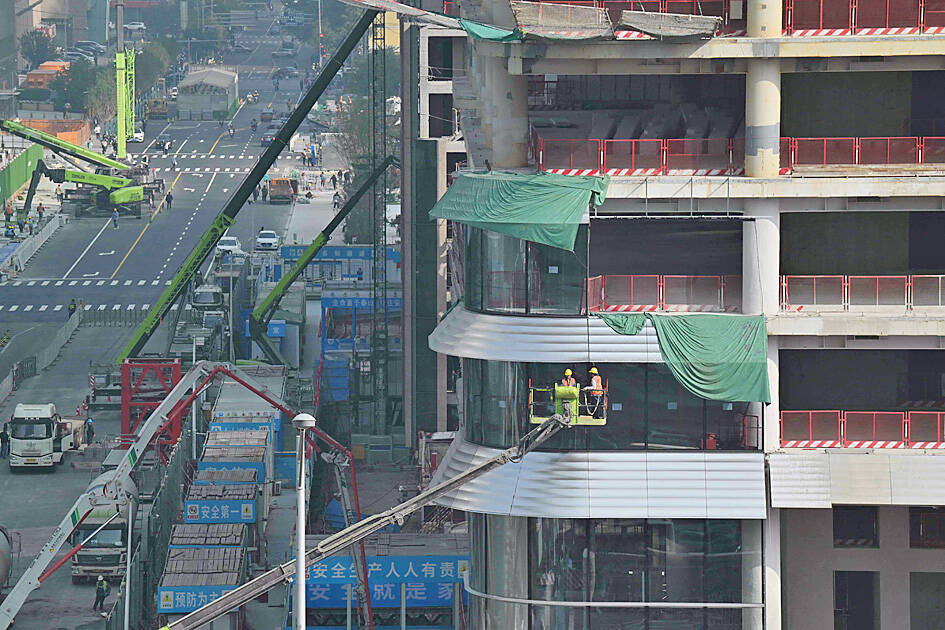China yesterday pledged to “significantly increase” debt to revive its sputtering economy, but left investors guessing on the overall size of the stimulus package, a vital detail to gauge the longevity of its recent stock market rally.
Chinese Minister of Finance Lan Foan (藍佛安) told a news conference that Beijing would help local governments tackle their debt problems, offer subsidies to people with low incomes, support the property market and replenish state banks’ capital, among other measures.
These are all steps investors have been urging China to take as the world’s second-largest economy loses momentum and struggles to overcome deflationary pressures and lift consumer confidence amid a sharp property market downturn.

Photo: AFP
However, Lan’s omission of a dollar figure for the package is likely to prolong investors’ nervous wait for a clearer policy road map until the next meeting of China’s rubber-stamp legislature, which approves extra debt issuance. A date for the meeting has yet to be announced, but it is expected in the coming weeks.
The news conference “was strong on determination, but lacking in numerical details,” said Vasu Menon, managing director for investment strategy at Singapore’s Oversea-Chinese Banking Corp (華僑銀行).
“The big bang fiscal stimulus that investors were hoping for to keep the stock market rally going did not come through,” he said, adding that this might “disappoint some” in the market.
A wide range of economic data in the past few months has missed forecasts, raising concerns among economists and investors that the government’s about 5 percent growth target this year was at risk, and that a longer-term structural slowdown could be in play.
Data for last month, which would be released over the coming week, is expected to show further weakness, but officials have expressed “full confidence” that the target would be met.
Beijing’s planned special bonds are aimed at boosting the capital available to banks — part of a push to get them lending in the hopes of firing up sluggish consumer spending.
China is also preparing to allow local governments to borrow more to fund the acquisition of unused land for development, aimed at pulling the property market out of a prolonged slump.
China still has room “to issue debts and increase the deficit” to fund the new measures, Lan said.
Beijing was “accelerating the use of additional treasury bonds, and ultra-long-term special treasury bonds are also being issued for use,” he said.
“In the next three months, a total of 2.3 trillion yuan [US$325.5 billion] of special bond funds can be arranged for use in various places,” he added.
Additional reporting by AFP

SECURITY: As China is ‘reshaping’ Hong Kong’s population, Taiwan must raise the eligibility threshold for applications from Hong Kongers, Chiu Chui-cheng said When Hong Kong and Macau citizens apply for residency in Taiwan, it would be under a new category that includes a “national security observation period,” Mainland Affairs Council (MAC) Minister Chiu Chui-cheng (邱垂正) said yesterday. President William Lai (賴清德) on March 13 announced 17 strategies to counter China’s aggression toward Taiwan, including incorporating national security considerations into the review process for residency applications from Hong Kong and Macau citizens. The situation in Hong Kong is constantly changing, Chiu said to media yesterday on the sidelines of the Taipei Technology Run hosted by the Taipei Neihu Technology Park Development Association. With

CARROT AND STICK: While unrelenting in its military threats, China attracted nearly 40,000 Taiwanese to over 400 business events last year Nearly 40,000 Taiwanese last year joined industry events in China, such as conferences and trade fairs, supported by the Chinese government, a study showed yesterday, as Beijing ramps up a charm offensive toward Taipei alongside military pressure. China has long taken a carrot-and-stick approach to Taiwan, threatening it with the prospect of military action while reaching out to those it believes are amenable to Beijing’s point of view. Taiwanese security officials are wary of what they see as Beijing’s influence campaigns to sway public opinion after Taipei and Beijing gradually resumed travel links halted by the COVID-19 pandemic, but the scale of

A US Marine Corps regiment equipped with Naval Strike Missiles (NSM) is set to participate in the upcoming Balikatan 25 exercise in the Luzon Strait, marking the system’s first-ever deployment in the Philippines. US and Philippine officials have separately confirmed that the Navy Marine Expeditionary Ship Interdiction System (NMESIS) — the mobile launch platform for the Naval Strike Missile — would take part in the joint exercise. The missiles are being deployed to “a strategic first island chain chokepoint” in the waters between Taiwan proper and the Philippines, US-based Naval News reported. “The Luzon Strait and Bashi Channel represent a critical access

Pope Francis is be laid to rest on Saturday after lying in state for three days in St Peter’s Basilica, where the faithful are expected to flock to pay their respects to history’s first Latin American pontiff. The cardinals met yesterday in the Vatican’s synod hall to chart the next steps before a conclave begins to choose Francis’ successor, as condolences poured in from around the world. According to current norms, the conclave must begin between May 5 and 10. The cardinals set the funeral for Saturday at 10am in St Peter’s Square, to be celebrated by the dean of the College